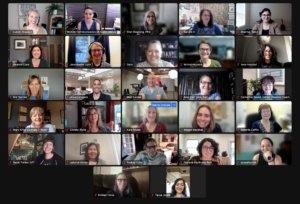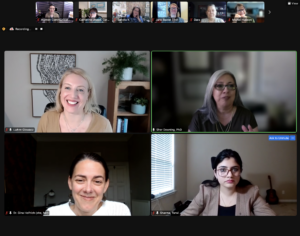Every time you scroll the headlines or flip on the news, it seems someone is talking about artificial intelligence (AI). It is literally everywhere. On May 4, it was the hot topic at the very well-attended “What’s the Deal with AI?” WCA Lunch.

Four great panelists shared their experience with and thoughts on how AI is currently affecting the comms world and also how it can be used effectively. The information shared and questions asked and answered showed how this rapidly changing field can be used by writers, editors and designers as a boon rather than a burden.
Our panelists were: Sher Downing, Ph.D., CEO & EdTech (Educational Technology) Strategist at Downing EdTech Consulting; Tanvi Sharma, data and AI product enthusiast ; LuAnn Glowacz, writer/editor, WordCove, LLC.; and Gina Helfrich, Ph.D., Baillie Gifford Programme Manager at the Centre for Technomoral Futures at Edinburgh Futures Institute. Jackie Sinex, managing director of WEBii and WCA president, moderated.
This talented group did a high-level overview demonstration of the infamous ChatGPT and other programs that will respond to specific queries in both text and image formats. The 40-something participants had a lot of questions and comments, and we’ll share some of those here, along with key points from the presentation.
 Q: What benefits of AI are you seeing?
Q: What benefits of AI are you seeing?
LuAnn: AI is a big, broad category. I would say the most useful thing to me is more automation-type AI, helping with processes and things like that. For instance, Otter AI will spit out a transcription of your interview. It uses AI by filling in the blanks of what it thinks you said if it can’t hear you. And Grammerly has only introduced a beta AI product recently.
Sher: Using it for research is really, really valuable. You can use it to help your client formulate their thoughts on what they want so that you can then have a conversation. It forces them to narrow their thought processes. This saves them money, because they are able to do this on their own. It buys them time, and maybe they discover they don’t really want to do this at all.
Tanvi: If you write the same query to Google, it will give you a very basic and generic response; it will just pull all the information from the internet. ChatGPT creates a response based on your specific requirement. …
Ask (AI) to create a one-minute script on a specific topic to a specific audience and it will create a robust script with image suggestions and more. …
Dall-e 2 will create realistic images and art from a description in natural language. It is a helpful tool for people in marketing design and content creation. The new Tome will create slides for a presentation on a topic.
Jane Baxter Lynn (comment from chat): It’s a bit like GPS, which is great if you have more or less of an idea of where you’re going. You can feed (AI) content and then ask it to be repurposed as, say, a blog and a video script.
Kristen Hicks (comment from chat): I’ve experimented with using it for writing social posts to promote a piece a little, and so far it seems like one of the best uses I’ve found for it. The other one is getting title ideas for pieces.
Q: What are some of the problems with the newer iterations of AI?
Tanvi: (AI) lacks human judgment and logic. The more information you include in your query, the better content you will get.
Sher: There is a humanistic side of this that will really have to stay with it. The old saying of data in, data out still rings true. It only sends out what we feed it. …
There is the danger of students using ChatGPT to write entire papers and turning them in as their own. (There is) a discussion on security on whether it’s really plagiarism. And one person using false data as true then passes that on and that workflow on to the next generation. You are affecting people’s lives, their income.
Gina: The tool makes things up a lot of times. Because the nature of AI is really the nature of probabilities, it doesn’t really have any notion of what is true and what is not true. ChapGPT made up a sexual harassment scandal against a professor that never happened.
There are also significant ethical questions that are very valid about the use of these tools. In addition to fabricating things, it also will show a lot of biases. If you type something into the Chat GPT interface it is not unlikely at all that you will get a very stereotypical Western, homogeneous response.
It’s important to remember it cannot access data in real time. It has limits and older information, which is fatal if you are writing about taxes.
LuAnn: I liken AI to an unpaid intern. Where did you get that information? Did you just make it up?
Tips and warnings from the panel about using AI now and down the line:
LuAnn: It won’t just give you sources. It will if you ask it, so you need to remember that.
Gina: ChatGPT terms say specifically that by adding your content/images/whatever to its system, “You are granting that AI tool a nonexclusive license to use, reproduce, edit and authorize others to use, repurpose and edit any of your comments in any and all forms, formats and media.”
Sher: You need to learn how to protect yourself and your work as no one else will. It’s like Pandora’s box. Once it’s out, it is really really hard to get it back in. Protect your pictures when you put them on social media, make sure they have a copyright, make sure they have a data time stamp.
Ellen Butler (comment from chat): It is imperative that we as communicators know as much as we can about generative AI and stay up with it as it evolves (the advantages, the flaws, the issues) so we can advise them on the use of these tools to support a company’s comms efforts (e.g. an exec says they want to use it to write their blog).
Gina: ChatGPT terms say specifically that by adding your content/images/whatever to its system, “you are granting that AI tool a nonexclusive license to use, reproduce, edit and authorize others to use, repurpose and edit any of your comments in any and all forms, formats and media.”
Tanvi: Use a plagiarism checker, but also an AI checker. (Panel suggested using Turnitin for plagiarism check. There are several AI checkers noted in a Google search.)
Tanvi was kind enough to share a compilation of AI tools with the group.
Michel Hudson shared a link to an article about some AI notetaking services out there.
- What’s the Deal with AI? - May 16, 2023

